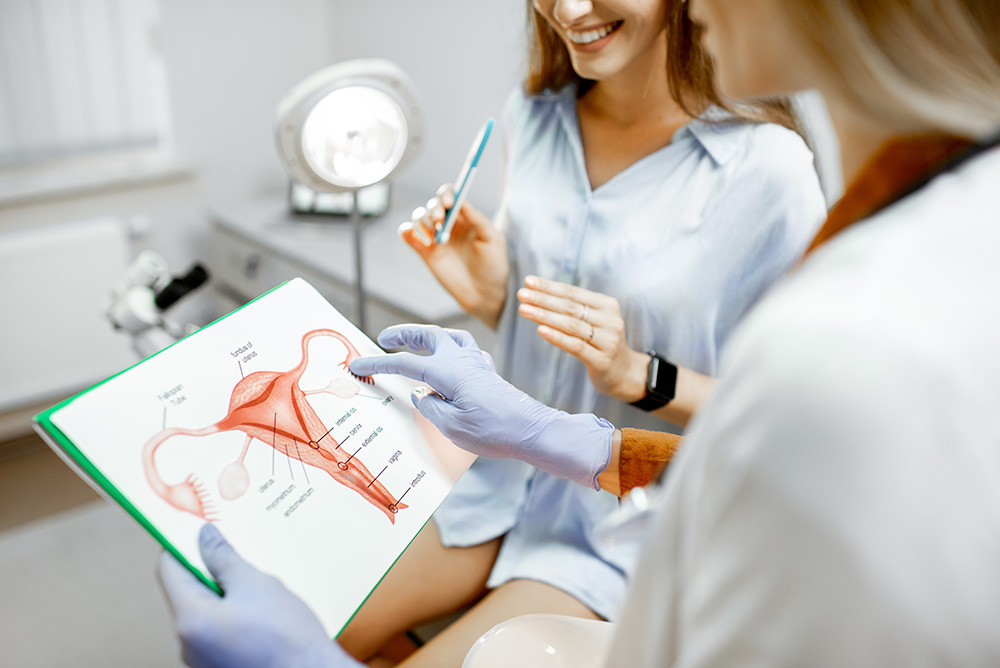PCOS & Effects On Skin

Polycystic Ovary Syndrome (PCOS) is a common hormone disorder that affects up to 10% of women of reproductive age and is one of the most common causes of female infertility. It is characterised by irregular menstrual cycles, increased levels of certain hormones, such as excess androgen hormones and enlarged ovaries containing multiple cysts.
While PCOS is commonly known for its impact on the reproductive system, it can also affect the skin.
The most common skin related symptoms of PCOS are an increase in facial and body hair, acne, and skin discoloration. PCOS sufferers may experience hirsutism, or excessive hair growth on the face, chest, abdomen, or back, due to increased levels of androgen hormones which stimulate the hair growth. Additionally, more severe acne may be experienced due to the same hormone imbalance.
Dark patches of skin called acanthosis nigricans, which are often found in the creases of skin such as the neck, groin, elbows, and knees, may also be experienced. These patches are caused by increased insulin levels, which are common among those with PCOS.
Skin tags, which are small, fleshy growths on the skin, are also a possible symptom.
Women with PCOS can experience physical symptoms such as pelvic pain, which can be uncomfortable and can lead to feelings of frustration and low self-esteem.
Emotionally, women with PCOS may experience depression, anxiety, and low mood. They may also feel overwhelmed, hopeless, struggle with body image issues, and feel unable to cope with symptoms that can be difficult to manage or change. Additionally, the emotional impact of infertility can cause feelings of sadness, grief, and isolation.
The exact cause of PCOS is unknown, although evidence suggests that it is related to abnormal hormone levels.
Although there is no cure for PCOS, there are treatments available that can help manage the symptoms and reduce the risk of long-term complications.
If you think you may be experiencing symptoms of PCOS, it’s important to speak to a doctor to ensure that any potential problems are addressed as soon as possible. They can help to diagnose and treat the condition, as well as provide you with the support and resources you need to manage them.
The best treatment for PCOS depends on each individual and their symptoms. Lifestyle changes, dietary modifications, regular physical activity, and weight management, along with some natural remedies, are recommended to help regulate hormones and reduce symptoms. Medications, such as the combined oral contraceptive pill, anti-androgens, and Metformin, can also be used to help manage symptoms. In some cases, surgery may be recommended to remove the cysts from the ovaries.
It’s also important to remember that you’re not alone. There are many support networks and resources available for those living with PCOS to help you cope. These can help to provide emotional support and understanding, which can be invaluable in managing the condition.
We Can Support You!
In Clinic Services
- Services In Women’s Health
- Aesthetic Acne Treatments
- Medical Grade Laser Hair Removal
- Nutrition
- Talk Therapy
- Acupuncture
- Yoga & Mindfulness
- Vitamins & Supplements

Contact Angela for a free chat about your skin concerns.
Contact: 07930661971
Author: Angela Taffinder the founder of Emporium Treatment Clinic. A practising Aesthetician for 35+ years, holistic and wellbeing advocate and yoga instructor.
Skin Care & Body Analysis & Consultation
Available at Emporium Treatment Clinic provided by Angela Taffinder the founder of Emporium Treatment Clinic and practising Aesthetician for 35+ years
Contact Us here
Health & Wellness Analysis & Consultation
Available at Emporium Treatment Clinic provided by highly qualified, experienced Doctors, Nutritionist, Holistic Medicine practitioners and Wellness experts.
Contact Us here
